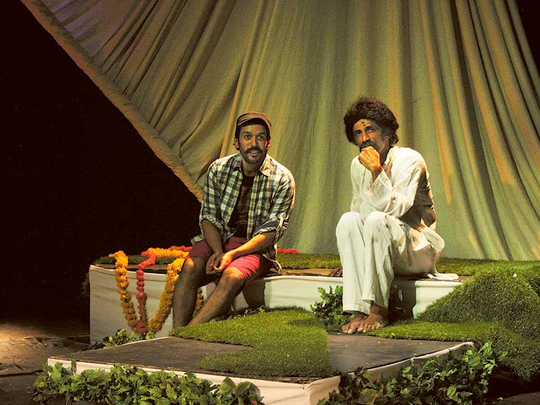
He’s mostly been spotted in small roles in big Bollywood films (Swades, Sarfarosh, Chameli,…), often playing the eccentric sadhu or henchman of a mafia don. But Makrand Deshpande says that’s not because he doesn’t get offered larger parts — he just doesn’t “have the dates” to do them.
“Why I’m seen in small roles is because I’m always busy with theatre. If they asked me for a 45-day outdoor shoot, I’d say ‘I’ll give you 15 days’, which I’d further reduce to 10 or five,” said the Indian writer-actor-director who is bringing his play Maa In Transit to Dubai on Saturday, October 15. “But there’s absolutely no regret because I enjoy theatre so much. Yes, in retrospect I do feel I would have liked to be part of some films I was offered — Lagaan, Munnabhai M.B.B.S. Where I am today is because of theatre. Even after so many years I still find theatre so fascinating — actually more now — because I see the simplicity of it”.
Much like the characters he’s known to play on the big screen, Deshpande’s plays have been said to be eccentric, and he concurs. More often than not he draws inspiration from his own life experiences to write his plays. Credited with over a 100 full-length and short plays, he says the only reason he’s able to write is because “I take my own journey in life and relive it through theatre”.
“Yes [Maa In Transit] is abstract but [when you lose] someone as dear as your mother, it’s the biggest loss. In Hindu religion when a person dies, the last rites are performed by a priest who tells you to do certain rituals in order to make the passage of the dead person to the ‘other world’ easier. Once the rituals are done the dead person will cross a river that divides the real and spiritual world,” said Deshpande. “The whole point [of the play] is to view these rituals as they are — what happens when a son cannot meet his mother before her death and he feels that he has this one more chance to be with her before she actually does cross this river. And he does meet his mother. As Hindus believe in rebirth the priest’s son takes this guy through his mother’s various births. This ‘journey’ is what makes this guy finally let go of her. Hence the title. The play oscillates between reality and fantasy. I feel that pain because it’s triggered from my own experience. My mother passed away three years ago and that’s when I wrote this play”.
But the plays are not just personal experiences but things he wants “to probe into”.
Phases of life
“I’m currently rehearsing a new play which is an adaptation of Shakespeare’s King Lear. All my life I’ve been against working on classics as I feel Shakespeare killed a lot of playwrights. My grudge is these are old plays done to death and still people want them. It’s only with King Lear that I thought he’s said something so relevant even today that I felt I should investigate it. I am trying to reflect on what I’ve seen, what I’ve felt because a person changes with each phase of his life. The main thing is to stop and witness what is happening, what it does to me and then react theatrically.
“One of the first plays I wrote was Dream Man. This was in the 1990s, at a time when we had these STD [standard trunk dialling] and ISD [international standard dialling] phone booths at every street corner in India and these used to be the main source of communication between people. There used to be this man who used to manage the booth and dial the numbers for us, but was never seen. I was there, Ashutosh Gowarikar [Indian film director] was there — all aspirants — and we would go to this guy and tell him to connect us to Mahesh Bhatt [veteran Bollywood filmmaker] and we would wait for hours. That’s when I thought ‘Why can’t he be my Dream Man? After all, he connected us to our dreams. The day the booth was shut, we were at our wits end because he would also take messages for us when we were away. In this sense they are personal,” said Deshpande.
“When I wrote the first scene of Maa In Transit, I cried, then the audience cried. So many people come up and say they did not know how to cope with their loss but the play helped open up their emotions. I was surprised when Naseer [Bollywood and theatre actor Naseeruddin Shah] told me how deeply affected he was. So I think one needs to bring theatricality in the drama of life”.
Perspective
That’s why Deshpande feels theatre is most powerful as medium of expression and creativity.
“You can keep changing it with every show, updating it with everyday experiences. Even if your dialogue doesn’t change, your interpretation or perspective changes and it changes with the audience, where we are staging the play … and it’s wonderful,” he said. “Moreover, the audience lives it as much as we do. It’s a direct connection because there’s an instant reaction. Any lingering problem I may be facing or anything I’m curious to find out, I write a play on it”.
So what would he have been if not an actor?
“I like to talk to people, connect with people. I always believe as a theatre person there’s is a choice to act or direct. Life is not optional, [so] you have to keep theatre close to life. I was a cricketer once, yes. Now I’m not so sure. I stopped playing because when I was 18-19, I thought as a cricketer I’ll have to retire by mid-30s and that’s something I never want to do — retire. With theatre, there’s no exit”.
Don’t miss it
Maa In Transit will be held at Ductac, Mall of the Emirates on Saturday, October 15, at 8pm.
Tickets start at Dh150. Call 050-6905849 or log on to ductac.org













